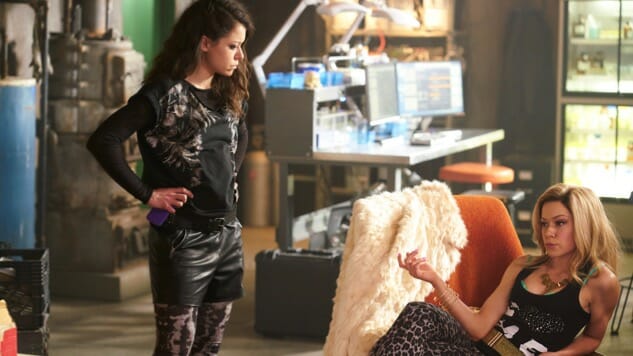Orphan Black‘s Fourth Season Ends on an Incredibly Dark and Exciting Note
(Episode 4.10, “From Dancing Mice to Psychopaths”)
TV Reviews Orphan Black
Well, that certainly got dark.
Yes, in start contrast to last year’s Orphan Black finale, which ended with Sarah reunited with Kira to the ethereal beauty of Sigur Ros, “From Dancing Mice to Psychopaths” (one of the show’s best episode titles, by the way) is the definition of a cliffhanger. Across the board, every character ends this year in grave danger. Rachel ascends back to the top after betraying those around her and, as icing on the cake, the supposed Big Bad of the whole series prepares to unveil himself. This is not at all surprising given that, earlier in the day, a press release announced that Orphan Black had been renewed for a fifth and final season. Still, in terms of teeing audiences up for the final year, this offers up a whole lot to chew on. The absolute worst thing you could say about this finale is that Alison is conspicuously missing.
As the episode opens we witness the final gasp of Evie Cho’s very brief stint as top gun after the clones exposed Brightborn’s nasty secret experiments. In retrospect, the whole Brightborn/Evie area feels like a bit of a wash. It also stinks that a villain as weak as Evie was the one to cause the Clones so much pain, by both killing Kendall and destroying their research (as short-lived as that was). It’s like if Spider-Man were finally defeated—not by Doc Ock or the Green Goblin—but by some lame one-off character like Kangaroo. As a final insult, Evie’s impotent cries of rage at her dismissal are quickly silenced after someone uses a bit of tech to worsen her genetic abnormalities, which appears to kill her or, at the very least, disable her in a major way.
With all that business out of the way and Cosima having figured out a cure for the clones’ degeneration, all is looking well in the world of the Clone Club. Krystal even appears and, after displaying an impressive grasp of all the players and conspiracies, reveals that Evie’s replacement, Dr. Van Lier, is the same man who took away Delphine’s body from the parking garage after she was shot down by Duko.
Unfortunately, because this wouldn’t be a finale without major complications, Rachel—after some standard kinky sex with Ferdinand—seizes this moment to blow up the peace alliance and loop herself back in with the Neolutionists. In the process, she ends up stabbing Susan and crippling Sarah with a jab to the leg (she’s also not a very dogged killer, as she first blatantly misses a clean shot of Rachel and then doesn’t even bother pursuing her, despite the fact that Rachel has lost the use of her leg). If nothing else, with this season being filled with great “before death” lines, Susan manages to get in one emotional twist of the knife, stating directly to Rachel’s face that she “regrets making [her].”
On a more positive note, yay, Delphine is definitely alive and is able to meet up with Cosima after she escapes Rachel’s grasp with Charlotte in tow. And while her survival has always been a major possibility (remember—if you don’t see the exact moment of death in TV, never assume it’s permanent), it’s nevertheless a powerful moment when the two lovers finally reunite.
Finally, as both Sarah and Susan bleed profusely from lethal wounds, Kira and Siobhan stand hostage under Ferdinand’s gun and Cosima struggles for life, Rachel savors her victory as she ascends back up the food chain. It’s at this point that first Susan and then a Van Lier-led board prepares her for an introduction to “the man behind the curtain”—namely, P.T. Westmoreland, who literally wrote the book on Neolution centuries ago. Though the episode cuts to black before we bear witness to the show’s ultimate antagonist, the mere concept of him is a stroke of creative genius. Given how thoroughly Orphan Black exemplifies an empowering feminist standpoint, who better to stand-in for the proverbial Final Boss than the very epitome of patriarchy—a megalomaniacal man whose mindset is quite literally hundreds of years old.
And here’s where a show like Orphan Black always gets me. The past few seasons have been exemplified by fairly strong openings, which transition into a muddled, middle sections before subsequently moving onto fascinating conclusions. What’s more, I’m glad that the last year will (hopefully) have a more centralized enemy heading into the final stretch.
So that’s it for Orphan Black Season Four. Overall, it’s been a more consistent ride than the likes of last year, albeit not without some of the over-convoluted plotting and odd tangents that typically weighed down the show’s brighter moments. Strangely—despite my somewhat diminished faith in the series—now that the end is finally nigh, I find myself shockingly intrigued to see how the creative team wraps this all up. Here’s to hopeful thinking!
Mark Rozeman is a Los Angeles-based freelance writer and regular contributor to Paste. You can follow him on Twitter.